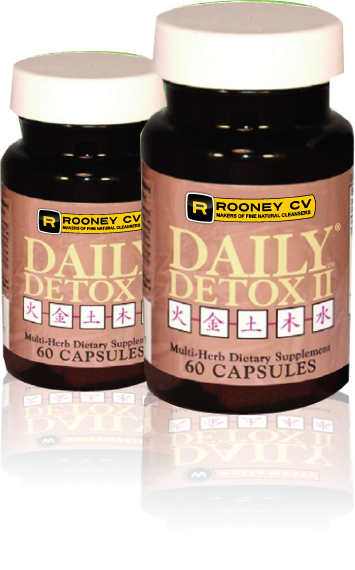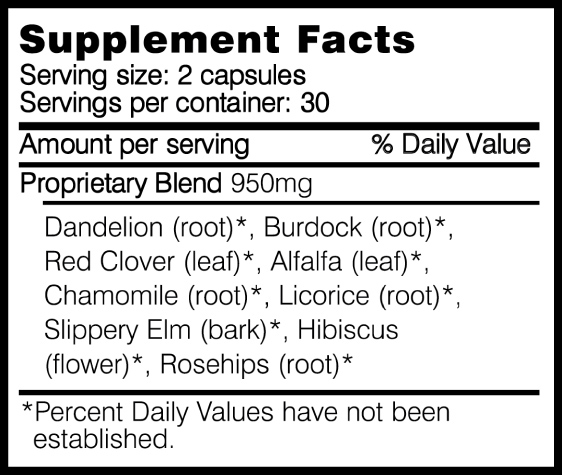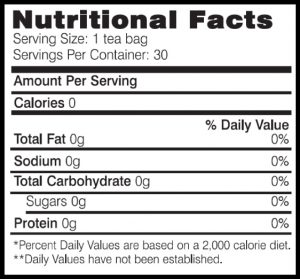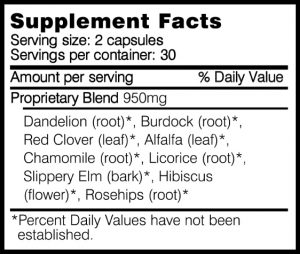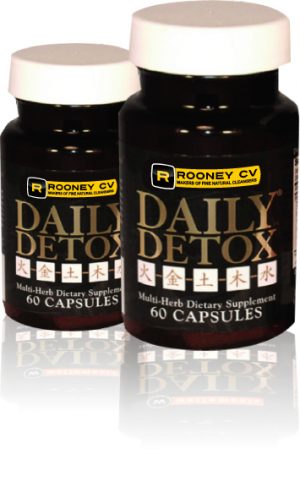Daily Detox® II Capsules
$10.95
For thousands of years, the Chinese have been using herbs to clear away toxins from the body.* In today’s environment, we are exposed to increasing levels of harmful pollutants such as smoke, caffeine, food toxins, alcohol etc. Daily Detox capsules combine nine Chinese purification herbs to help assist the body in clearing these potentially harmful toxins.
Out of stock
Description
For thousands of years, the Chinese have been using herbs to clear away toxins from the body.* In today’s environment, we are exposed to increasing levels of harmful pollutants such as smoke, caffeine, food toxins, alcohol etc. Daily Detox capsules combine nine Chinese purification herbs to help assist the body in clearing these potentially harmful toxins.
100% Natural Herbs – No Caffeine or Artificial Additives – Non Irradiated, Not a laxative
Product Description:
Daily Detox® II capsules contains the same proportions of the 9 herbs as in our Daily Detox® II tea.
The capsules give you the convenience if you’re on the go or unable to enjoy a great cup of tea.
SKU: 112311
Description: DDII Capsules 60 Capsules
Case Count: 12
Case Dimensions 12″ x 4″ x 4″
Case Weight: 1.5lbs.
Additional Instructions:
Drink 8 to 10 glasses of water per day. Maintain a healthy diet low in fat and high in fresh fruits and vegetables. Exercise regularly at least 3 times per week. Get plenty of fresh air and sunshine. Store at room temperature.
Dandelion is used for loss of appetite, upset stomach, intestinal gas, gallstones, joint pain, muscle aches, eczema, and bruises. Dandelion is also used to increase urine production and as a laxative to increase bowel movements. It is also used as skin toner, blood tonic, and digestive tonic. Some people use dandelion to treat infection, especially viral infections, and cancer. |
People take burdock to increase urine flow, kill germs, reduce fever, and “purify” their blood. It is also used to treat colds, cancer, anorexia nervosa, gastrointestinal (GI) complaints, joint pain (rheumatism), gout, bladder infections, complications of syphilis, and skin conditions including acne and psoriasis. Burdock is also used for high blood pressure, “hardening of the arteries” (arteriosclerosis), and liver disease. Some people use burdock to increase sex drive. |
Red clover is used for cancer prevention, indigestion, high cholesterol, whooping cough, cough, asthma, bronchitis, and sexually transmitted diseases (STDs). Some women use red clover for symptoms of menopause such as hot flashes; for breast pain or tenderness (mastalgia); and for premenstrual syndrome (PMS). Red clover is applied to the skin for skin cancer, skin sores, burns, and chronic skin diseases including eczema and psoriasis. |
|
Hibiscus is used for treating loss of appetite, colds, heart and nerve diseases, upper respiratory tract pain and swelling (inflammation), fluid retention, stomach irritation, and disorders of circulation; for dissolving phlegm; as a gentle laxative; and as a diuretic to increase urine output. |
Alfalfa is used for kidney conditions, bladder and prostate conditions, and to increase urine flow. It is also used for high cholesterol, asthma, osteoarthritis, rheumatoid arthritis, diabetes, upset stomach, and a bleeding disorder called thrombocytopenic purpura. People also take alfalfa as a source of vitamins A, C, E, and K4; and minerals calcium, potassium, phosphorous, and iron. |
People take slippery elm for coughs, sore throat, colic, diarrhea, constipation, hemorrhoids, irritable bowel syndrome (IBS), bladder and urinary tract infections, syphilis, herpes, and for expelling tapeworms. It is also used for protecting against stomach and duodenal ulcers, for colitis, diverticulitis, GI inflammation, and too much stomach acid. Slippery elm is also taken by mouth to cause an abortion. Slippery elm is applied to the skin for wounds, burns, gout, rheumatism, cold sores, boils, abscesses, ulcers, toothaches, sore throat, and as a lubricant to ease labor. |
|
Licorice is used for various digestive system complaints including stomach ulcers, heartburn, colic, and ongoing inflammation of the lining of the stomach (chronic gastritis). Some people use licorice for sore throat, bronchitis, cough, and infections caused by bacteria or viruses. Licorice is also used for osteoarthritis, systemic lupus erythematosus (SLE), liver disorders, malaria, tuberculosis, food poisoning, and chronic fatigue syndrome (CFS). Licorice is sometimes used along with the herbs Panax ginseng and Bupleurum falcatum to improve the function of the adrenal glands, especially in people who have taken steroid drugs long-term. Steroids tend to suppress the activity of the adrenal glands. The adrenal glands produce important hormones that regulate the body’s response to stress. Licorice is also used in an herbal form called Shakuyaku-kanzo-to to increase fertility in women with a hormonal disorder called polycystic ovary syndrome. In combination with other herbs, licorice is also used to treat prostate cancer and the skin disorder known as eczema. Some people use licorice as a shampoo to reduce oiliness in their hair. |
German chamomile is used for intestinal gas, travel sickness, stuffy nose, hay fever, nervous diarrhea, attention deficit-hyperactivity disorder (ADHD), fibromyalgia, restlessness, and trouble sleeping. It is also used for digestive system disorders, stomach ulcers, colic, and menstrual cramps. Some people apply German chamomile directly to the skin for hemorrhoids; breast soreness; leg ulcers; and bacterial skin diseases, including those of the mouth and gums. It is also used on the skin for treating or preventing damage to the inside of the mouth caused by chemotherapy or radiation. Roman chamomile is applied directly to the skin for pain and swelling (inflammation) and as a germ-killer in ointments, creams, and gels used to treat cracked nipples, sore gums, and irritation of the skin. It is also used topically for wounds, burns, eczema, frostbite, diaper rash, bedsores (decubitus ulcers), and hemorrhoids. Roman chamomile is sometimes mixed with other herbs and taken by mouth for liver and gallbladder disease, gallstones, fatty liver, chronic heartburn, loss of appetite, digestive disturbances, a heart condition called Roemheld’s syndrome, indigestion in infants, and certain types of constipation. It is used as a “blood purifier” and general female tonic; and to prevent menstrual cramps and irregular periods. Some people put Roman chamomile in a steam bath and inhale it for sinus inflammation, hay fever, sore throat, and ear inflammation, and as a painkiller. |
Fresh rose hips contain a lot of vitamin C, so they share many uses with vitamin C including preventing and treating colds, flu, and vitamin C deficiencies. Rose hips are also used for stomach disorders including stomach spasms, stomach acid deficiency, preventing stomach irritation and ulcers, and as a “stomach tonic” for intestinal diseases. They are also used for diarrhea, constipation, gallstones, gallbladder ailments, lower urinary tract and kidney disorders, fluid retention (dropsy or edema), gout, back and leg pain (sciatica), diabetes, chest ailments, fever, increasing immune function during exhaustion, increasing blood flow in the limbs, increasing urine flow and quenching thirst. |

